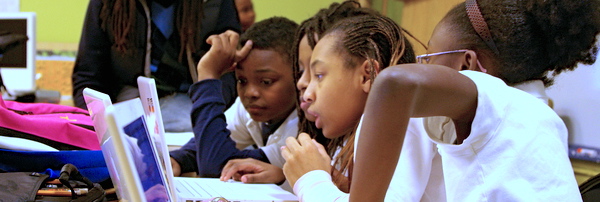Glazer’s two sections of AP English Literature and Composition and two sections of California's college-prep-focused Expository Reading and Writing Course spend one class period weekly in a
computer lab responding to a range of assignments the 6th graders post on the cloud-based iRemix platform. The platform allows for varying levels of privacy, including blog posts and forum discussions that can be viewed by every teacher and student, and more private notebooks that are only accessible to the 6th grade writer, his or her 12th grade mentors, and teachers.
Glazer’s students then switch from mentor to student in a separate Edmodo online classroom community and discuss their successes and failures as mentors. A sample of their thoughts:
- Breanna S.: It's tough for me to explain their error. I know how to fix their sentences, but I actually had to google why it should be changed. It adds more of a challenge and it helps me remember grammar rules. To be honest, I am worried that I will give them wrong information, but I always try to double check.
- Mavee P.: I found this particularly difficult to provide constructive feedback[,] instead of strict criticism[,] while remaining encouraging. In addition, the balance between too formal and laid back was a constant problem in my comments.
- Lisa H.: I am used to just blatantly pointing out errors because I know my peers won't be offended and can handle constructive criticism. Now I have to put more thought and creativity into the feedback so I won't hurt the kids' feelings. Some of these kids talk about personal things like the death of their family members or worrying about gangs and getting shot, and I wish I knew how to address these topics while still pointing out their errors.
That mutual feeling of concern is ultimately a good thing, said Glazer, who added that it has translated into a heightened awareness of their own writing strengths and weaknesses.
Edwards, meanwhile, said that despite their mentors' concerns about upsetting the 6th graders, their advice has been received better than it might have been from more traditional sources.
“It's actually a lot more powerful than we tend to think it is, because kids tend to value other kids' feedback a bit more than their parents', teachers', etcetera,” Edwards said.
As the students shift into the role of mentor, teachers' roles also change.
The 6th-grade teachers involved, Edwards said, are still ultimately responsible grading students' finished product, and also respond to student work on the iRemix platform. But the quality of the feedback from 12th graders, in general, has been good enough that Edwards said teachers' most important role might be to help their own students push past their initial shyness or hesitance to work with a stranger on the other side of the country.
“Their role initially was to build that community,” she said.
Glazer said she focuses on regularly modeling and discussing the meaning and practice of responsible mentoring.
“Students will say, 'What do I do when I see five sentences and every sentence has some kind of error?'” she said. “Now I step back and say, 'What do you think I should do? If you were me and I was your student, what would you like me to tell you?'”


